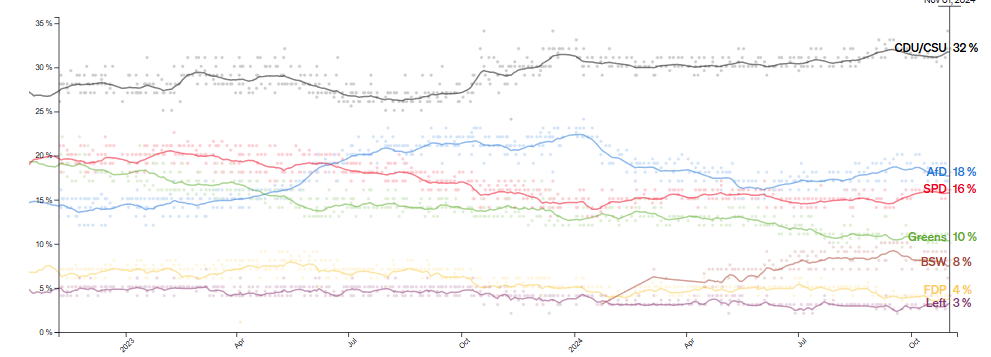Germany: More Headwinds for an Ailing Economy?
After months of clear internal tensions, the three-party coalition collapsed on Wednesday after Chancellor Olaf Scholz (Social Democrat) sacked Finance Minister Christian Lindner (leader of the Free Democratic Party (FDP). The two had been seeing repeated rifts on spending and economic reforms, with the Scholz (and the Greens, the third collation party) wanting to boost deficit spending, while the fiscally conservative Linder refused to allow the so-called debt rule to be diluted. Central to the disagreements was the adoption of the 2025 budget by parliament — in which a gap of possibly 1% of GDP was at the centre. Forming new and stable administration in a general election likely by March seems unlikely!
Figure 1: German Opinion Polls

Source: Politico
The result is that the Chancellor has had to call for a parliamentary confidence vote on January 15. If, as is likely, Scholz loses that vote, a snap election is set to take place by March, effectively six months earlier than the formal schedule. The even deeper political instability in Germany comes alongside political paralysis in France and makes it even more uncertain how Europe will lead policy discussions with Donald Trump after his clear win in the U.S. election. Indeed, an analysis from the German Economic Institute estimates that a new trade war based around tariffs could cost Germany €180 billion over Trump’s likely four years in office.
Moreover, the question is just how paralysed policy making in Germany may develop given the likely difficulty in forming a majority administration. Opinion polls suggest an early election would be won by the centre-right Christian Democratic Union (CDU) but far from a majority. They may be able to forge a coalition with either/both the Socialist and/or Greens but there are huge differences on issues such as immigration in recent years and military aid for Ukraine. In addition, the far-right (AfD) is polling strongly (similar to the Social Democrats, Figure 1) and its populist policy agenda would be anathema to traditional parties in terms of forging any alliance. This is important as amid opposition calls for an earlier confidence vote than January, but if so, then an earlier general election is unlikely to resolve political and policy uncertainty.
German business confidence is already low. But with politics becoming even more volatile in coming months and where and fiscal support looks to be fading, the current recession bound German economy faces even more headwinds, with the latest coming from the other side of the Atlantic.